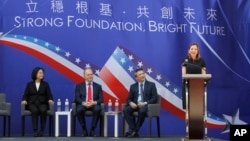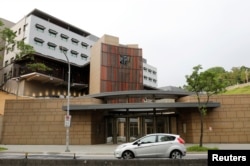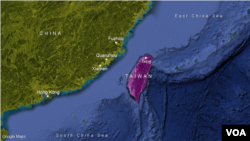The United States has opened a new state-of-the-art facility in Taiwan that serves as Washington's de facto embassy in the self-ruled island that Beijing claims is part of its territory.
Taiwanese President Tsai Ing-wen and U.S. Assistant Secretary of State Marie Royce were among the dignitaries on hand for Tuesday's unveiling ceremony for the new $256 million American Institute in Taipei, which serves U.S. interests in the absence of formal diplomatic ties with Taiwan.
The opening of the new facility angered Beijing. Chinese Foreign Ministry spokesman Geng Shuang said China had lodged "stern representations" with Washington. Geng said the ministry urged the United States to uphold the "one China" policy and avoid damaging China-U.S. relations, as well as "peace and stability" in the Taiwan Strait.
China and Taiwan split after Mao Zedong's Communists drove the Nationalists off the mainland in the 1949 civil war, but Beijing has vowed to bring Taiwan under its control — if necessary, by force.
Beijing has broken off contact with Taipei since President Tsai, the leader of the independence-leading Democratic Progressive Party, was elected president in 2016 and refused to acknowledge that Taiwan is part of China. It has pressured other nations to break off diplomatic relations with Taiwan, and has increased its military presence with naval and aerial exercises through the Taiwan Strait.
The United States cut its formal diplomatic ties with Taiwan in 1979, recognizing the communist rulers in Beijing as the country's sole government as part of a "One China" policy. However U.S. lawmakers have continued to lobby to support Taiwan, and Washington still sells hundreds of millions of dollars of weapons to Taiwan, despite China's objections. In March, President Donald Trump signed into law a bill that encourages high-level exchanges of officials with Taiwan.







